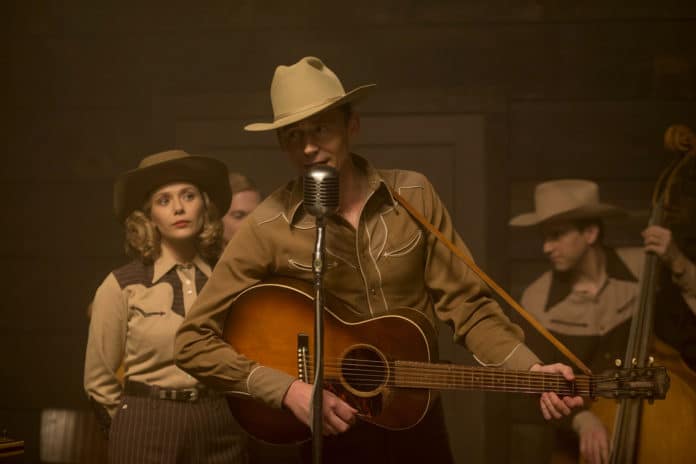The musical progeny of the late country star Hank Williams (1923-1953) are of two minds as to whether actor Tom Hiddleston – a Brit best known for playing Loki in Marvel’s “Thor” movies – delivers a performance worthy of their grandfather in the biopic “I Saw the Light.”
As granddaughter Holly Williams told Rolling Stone, Hiddleston put his “whole heart and soul into it.” Then again, grandson Shelton Hank Williams – a musician who performs as Hank 3 – complained on Facebook, after hearing Hiddleston perform in character at a 2014 music festival, that the actor had no “moan or soul” in his voice.
Oh, there’s a soullessness to the movie, all right, but Hiddleston is not its source. The actor, who drops his clipped English diction here for a better-than-passable Alabama drawl, makes for a believable Williams, hunching forward at the microphone as Williams did – a result of chronic back pain from spina bifida – and imitating, if not replicating, the singer’s signature nasally vocal hiccups. Offstage, Hiddleston is even better at evoking Williams’s sly charm, a blend of lingering hurt and earnestness.
It’s the movie that doesn’t tell the truth.
I don’t mean that literally. Written and directed by Marc Abraham, “I Saw the Light” suffers from many of the same problems that plagued the filmmaker’s directorial debut, “Flash of Genius,” a biographical portrait of Robert Kearns, the inventor who sued Ford and Chrysler after they stole his idea for the intermittent windshield wiper. Like that 2008 film, “I Saw the Light” gets the superficial details of the story right without ever allowing you to get inside the heart of its subject.
Mostly, that’s the result of a screenplay that feels overly episodic, tracking Williams’s rapid rise from obscurity to fame like any number of conventional biographies. After a black-and-white reminiscence introducing Williams’s music publisher, Fred Rose (Bradley Whitford), who appears throughout the film as a kind of one-man Greek chorus, commenting on the action, the movie jumps to a strangely dreamlike, a cappella rendition of “Cold, Cold Heart.”
But don’t get your hopes up. Once that surreal scene is done, the movie quickly settles into a groove of sluggishly dutiful chronology. From the 1944 wedding of Williams and his first wife, Audrey (Elizabeth Olsen) – in an Alabama gas station, by a justice of the peace – we then hop, with frequent on-screen dates and datelines, to Louisiana, Texas, Tennessee, Washington, New York and California, as “I Saw the Light” charts the dissolution of William’s marriage and his worsening alcoholism, with a sense of inevitability, if not tragedy. By the time the story gets to Williams’ death, in the back seat of a car on the way to a show, it feels like it could have ended – or should have ended – a long time ago.
Bizarrely, Abraham elects to tell, when he could show, some of the most interesting – or at least most cinematic – moments in Williams’s life: his 1951 appearance on “The Perry Como Show” and a hunting accident that same year, after which he became increasingly dependant on drugs. Both of those scenes occur, inexplicably, off camera.
Following the Como show appearance, Abraham lets us listen in on something far less electric: an interview with a newspaper reporter (David Krumholtz) who grills Williams – unsuccessfully, and in dramatically unconvincing fashion – about the dark, twisted roots of country music. Williams offers no insight.
At other times, the script references things that haven’t even happened yet. Divorce papers, for instance, speak of Williams’s “violent and ungovernable temper” well before we have seen any evidence of that. (A single drunken scene with a loaded pistol comes much later.) And Audrey refers to her husband sleeping with “a different woman every night” while on the road, when a quick shot of canoodling is all we’ve scene at that point.
This has the cumulative effect of making her seem like the deranged one. It’s as if “I Saw the Light” wants to trash-talk Williams, even as it goes out of its way to avoid speaking ill of him.
As the film wears on, our protagonist becomes an increasingly unreliable performer, missing shows while intoxicated and ultimately getting fired from the Grand Ole Opry. But the precise cause of all this bad behavior – whether a bad back, an absentee father or something more existential – is left unexplored. “I Saw the Light” isn’t just incohesive, but ultimately – and far more frustratingly – incoherent.
—
One and a half stars. Rated R. Contains coarse language, brief sexuality and nudity, and drug use. 123 minutes.
Ratings Guide: Four stars masterpiece, three stars very good, two stars OK, one star poor, no stars waste of time.






